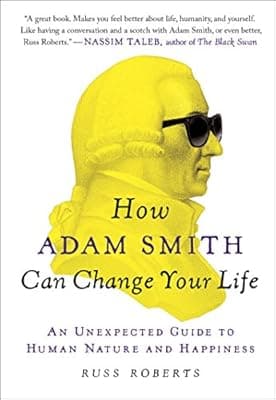
How Adam Smith Can Change Your Life: An Unexpected Guide to Human Nature and Happiness
by Russell D. Roberts
12 highlights
Highlights
Imagining an impartial spectator encourages us to step outside ourselves and view ourselves as others see us. This is a brave exercise that most of us go through life avoiding or doing poorly. But if you can do it and do it well, if you can hover above the scene and watch how you handle yourself, you can begin to know who you really are and how you might improve. Stepping outside yourself is an opportunity for what is sometimes called mindfulness—the art of paying attention instead of drifting through life oblivious to your flaws and habits.
Location 316
Smith encourages us to step outside ourselves and ask whether someone watching would see us as more of a whiner than a crusader for justice.
Location 336
If you want to get better at what you do, if you want to get better at this thing called life, you have to pay attention. When you pay attention, you can remember what really matters, what is real and enduring, versus what is false and fleeting.
Location 351
Most choices in life aren’t quite this dramatic. And most of us aren’t anything like the son of Warren Buffett, the great investor whose company, Berkshire Hathaway, had a stock that really did grow a thousandfold over the last thirty-five years. Warren’s son Peter Buffett actually took a chance on the music; he dropped out of Stanford at nineteen, sold the stock his father had given him, and asked his father for help with planning and budgeting in order to make that $90,000 last as long as possible. Four years went by. Peter Buffett scraped along, living in a small apartment and driving a beat-up car, trying, mostly unsuccessfully, to find paying work in the music business. Then he got a break. A neighbor introduced him to someone who needed music for an advertisement for a new cable television channel called MTV. One thing led to another, and Peter Buffett ended up with a successful career as a musician, which is no mean feat. He has written songs for movies and television and won an Emmy for his score for a TV documentary. He’s had a meaningful life, doing something he loved.
Location 374
When we earn the admiration of others honestly by being respectable, honorable, blameless, generous, and kind, the end result is true happiness.
Location 414
Smith is suggesting that Madoff was a less than happy man before he went to prison, not because he was afraid of being caught but because in his own eyes he was already caught; he was a failure, and he knew it even when no one else did. Madoff reportedly expressed relief when he was arrested.
Location 433
So if I get praise I don’t deserve, says Smith, it should bother me. The praise feels good. But knowing it is undeserved makes it impossible to enjoy, he says. Why? It’s as if someone else is being complimented instead of you:
Location 443
The wise man may reject the praise he does not deserve. But it’s so hard to be wise. And it’s our own praise that’s hardest to reject.
Location 492
According to Smith, our behavior sometimes falls short of our ideals not because we’re bad people and not because our self-interest outweighs our benevolence, but because we don’t realize we’re not living up to our ideals.
Location 615
It’s easy to convince yourself that you’re doing the right thing when you’re merely doing what benefits yourself.
Location 624
Using the wrong map unknowingly is worse than no map at all—it leads you to overconfidence that can be more harmful than confronting the reality that you’re lost.
Location 698
Sometimes even the best quantitative analysis is worse than none at all because it gives the illusion of science, what Hayek called scientism.
Location 700